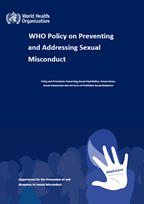Victims and survivors first
Whenever possible we listen to the needs and wants of victims and survivors to shape our work. And we take a victim and survivor-centred approach throughout the safeguarding cycle.
Sexual misconduct - exploitation, sexual abuse, sexual harassment (SEAH), sexual violence – by our personnel violates the rights and well-being of the people we serve and the people with whom we serve. Such behaviours are directly in opposition to WHO’s values and our abiding responsibility to do no harm.
Sexual exploitation and abuse (SEA) of the populations we serve, and sexual harassment (SH) of our own workforce require similar prevention and response approaches because they stem from the same power differentials, inequities, drivers, and risks. Using the umbrella term, sexual misconduct, clarifies that these acts pertain to the WHO workforce, are prohibited, and therefore lead to disciplinary action.
WHO has zero tolerance for any form of sexual misconduct, for inaction and for retaliation against those who raise complaints or bear witness. Our work prioritizes the rights and needs of victims and survivors.
In 2021, WHO launched an intense period of prevention and response actions following the harrowing accounts of victims and survivors of SEA during the 10th Ebola outbreak in the Democratic Republic of the Congo encapsulated in the Management Response Plan that concluded in December 2023. To build on and institutionalize this progress, our future work is framed by the three-year strategy for preventing and responding to sexual misconduct.
Sexual exploitation
Sexual exploitation is any actual or attempted abuse of a position of vulnerability, differential power, or trust, for sexual purposes, including threatening or profiting monetarily, socially or politically
from the sexual exploitation of another.
Sexual abuse
Sexual abuse is the actual or threatened physical intrusion of a sexual nature, whether by force or under unequal or coercive conditions. Sexual exploitation and abuse includes sexual relations with a child
(18-years-old or younger), in any context.
Sexual harassment
Sexual harassment refers to prohibited conduct in the work context and can be committed against UN staff and related personnel. In context of the United Nations, sexual harassment primarily describes
prohibited behaviour against another UN staff or related personnel, which may also include nationals of the host state. It is defined for UN staff by ST/SGB/2008/5 and similar directives for uniformed personnel and involves any unwelcome
sexual advance, request for sexual favour, verbal or physical conduct or gesture of a sexual nature, or any other behaviour of a sexual nature that might reasonably be expected or be perceived to cause offence or humiliation to another,
when such conduct interferes with work, is made a condition of employment or creates an intimidating, hostile or offensive work environment.
Source: The United Nations Glossary on Sexual Exploitation and Abuse
Policies and Codes of Conduct are being revised, in the meantime you can access existing documents here:
WHO Policy on Preventing and Addressing Sexual Misconduct
Preventing and addressing retaliation
Policy on Preventing and Addressing Abusive Conduct
Code of conduct: to prevent harassment, including sexual harassment, at WHO events
Prevention and response to sexual misconduct: WHO stakeholder review conference 2023
A75/29 Prevention of sexual exploitation, abuse and harassment Report by the Director-General
EB150/33 Prevention of sexual exploitation, abuse and harassment Report by the Director-General
EB150/34 Report of the IOAC for the WHO Health Emergencies Programme’s Subcommittee for the Prevention and Response to Sexual Exploitation, Abuse and Harassment
Final Report of the Independent Commission
A74/51 External and internal audit recommendations: progress on implementation
EB 148/4 Preventing sexual exploitation, abuse, and harassment 21 May 2021
A74/34 Report of the External Auditor 17 May 2021
Senior PSEA Technical Support Mission to the Democratic Republic of the Congo
CEB Statement on Addressing Sexual Harassment within the Organizations of the UN System




We still have a long way to go to ensure Zero tolerance for sexual misconduct by our workforce. During 2023-2025, together with UN and humanitarian partners, and national governments, we will focus on:
Whenever possible we listen to the needs and wants of victims and survivors to shape our work. And we take a victim and survivor-centred approach throughout the safeguarding cycle.
Strong policies and practices WHO's policies, procedures and practices are supportive and promote safeguarding against all forms of sexual misconduct.
WHO is able and accountable for taking measures for safeguarding against sexual misconduct in our programmes and operations by our personnel and our implementing partners.
WHO's workforce supports and demonstrates a culture of ethical, gender-equal behaviour.
#NoExcuse podcast |
.tmb-768v.jpeg?sfvrsn=826d7380_1)